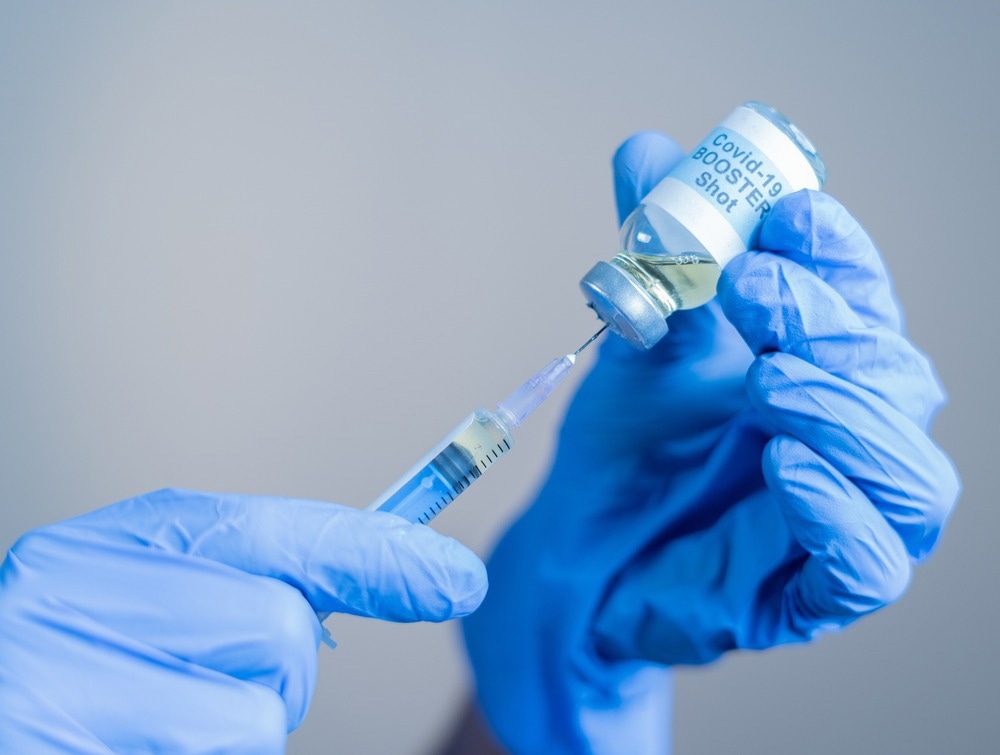.jpg) By Dr. Chinta SidharthanJan 30 2023Reviewed by Danielle Ellis, B.Sc.
By Dr. Chinta SidharthanJan 30 2023Reviewed by Danielle Ellis, B.Sc.
In a recent study posted to Preprints with The Lancet*, researchers evaluated the safety profiles of booster doses of the monovalent and bivalent messenger ribonucleic acid (mRNA) coronavirus disease 2019 (COVID-19) vaccine BNT162b2 in adults above the age of 60.
 Study: Safety of COVID-19 Monovalent and Bivalent BNT162b2 mRNA Vaccine Boosters for Adults 60 Years and Above: A Large-Scale Retrospective Study. Image Credit: WESTOCK PRODUCTIONS/ShutterstockBackground
Study: Safety of COVID-19 Monovalent and Bivalent BNT162b2 mRNA Vaccine Boosters for Adults 60 Years and Above: A Large-Scale Retrospective Study. Image Credit: WESTOCK PRODUCTIONS/ShutterstockBackground
Although the development of various COVID-19 vaccines has successfully reduced the morbidity and mortality due to severe acute respiratory syndrome coronavirus 2 (SARS-CoV-2) infections worldwide, the disease continues to pose a risk among the elderly population in many countries. Many countries have made booster doses of monovalent and bivalent mRNA vaccines available to the older population. However, the vaccine coverage seems to be diminishing, presumably due to safety concerns about these booster doses.
While the United States (U.S.) Centers for Disease Control and Prevention (CDC) and Food and Drug Administration (FDA) reported an increased risk of ischemic stroke associated with the booster dose of the bivalent COVID-19 vaccine from Pfizer-BioNTech, the European Medicines Agency (EMA) did not report any such association. Therefore, a better understanding of the monovalent and bivalent booster vaccine safety profile can help reduce vaccine hesitancy and improve vaccine uptake rates.
About the studyIn the present study, the team conducted a large-scale retrospective analysis of the medical records of over 800,000 individuals above the age of 60 registered at Israel’s largest healthcare organization. These individuals had received the first two and, in some cases, three booster doses of the monovalent or bivalent mRNA COVID-19 vaccine BNT162b2 between the end of July 2021 and the beginning of November 2022.
The researchers analyzed the association between 27 adverse events, especially cardiovascular events, and non-COVID-19-related hospital admissions and booster vaccines. The risk differences between 28 days before and after vaccination were evaluated for each of the 27 adverse reactions.
The measured primary outcomes were the cumulative non-COVID-19 related hospital admissions, non-COVID-19 related hospitalizations for cardiovascular events, and the risk difference between the baseline and the post-booster dose period for the first and second monovalent BNT162b2 booster or the first, second, and third bivalent BNT162b2 booster dose. The risk differences were calculated pairwise for each individual and each adverse event.
Additionally, a sensitivity analysis was conducted where the risk differences were evaluated between the baseline and one, two, three, and four weeks following vaccination. A subgroup analysis was also conducted where the study population was further divided based on age and cardiovascular status, with the groups consisting of individuals between the ages of 60 and 70, 70 and 80, and above 80, and individuals with and without cardiovascular issues.
ResultsThe results reported that out of the 863,886 individuals included in the study, 702,490 had received the first booster dose of the monovalent vaccine, 369,859 had taken up the second booster monovalent vaccine, and 49,502 had received the bivalent booster dose. The findings reported no association between the monovalent or bivalent booster vaccines and an increased risk of non-COVID-19 related hospitalization events.
Of the 27 adverse events investigated in the study, pericarditis showed a weak association with booster vaccines, but there was no association between the booster doses and other adverse events such as myocardial infarction, ischemic stroke, or heart failure. Furthermore, the subgroup analysis confirmed the results and showed no association between booster vaccine doses and adverse events based on age or cardiovascular background.
The study also reported that vaccine uptake was associated with age and cardiovascular status, and individuals who received the second booster dose of the monovalent vaccine or the bivalent booster vaccine were generally older than those who received the first booster dose and were likely to have a background of cardiovascular events.
Furthermore, the number of non-COVID-19 related hospitalizations following the bivalent booster dose was 72, 10 less than the number of hospitalizations at baseline. The risk difference for the number of non-COVID-19 related hospital admissions was -2.02, and that for the number of non-COVID-19 related hospitalizations for cardiovascular events was -3.03.
ConclusionsTo summarize, this retrospective study analyzed medical records of individuals in Israel above the age of 60 who had received one, two, or three doses of the monovalent or bivalent vaccine and evaluated the association between the booster doses and the risk of non-COVID-19 related hospitalizations and adverse reactions.
Overall, the results indicated no correlation between the booster vaccines and increased risk of adverse reactions, including various cardiovascular events. The authors concluded that the BNT162b2 monovalent and bivalent mRNA vaccine could be safely administered to individuals over 60.
*Important noticePreprints with The Lancet publishes preliminary scientific reports that are not peer-reviewed and, therefore, should not be regarded as conclusive, guide clinical practice/health-related behavior, or treated as established information.
Journal reference:
Yamin, D., Yechezkel, M., Arbel, R., Beckenstein, T., Sergienko, R., Duskin-Bitan, H., Yaron, S., Peretz, A., Netzer, D., and Shmueli, E.: Safety of COVID-19 Monovalent and Bivalent BNT162b2 mRNA Vaccine Boosters for Adults 60 Years and Above: A Large-Scale Retrospective Study. Preprints with The Lancet. https://papers.ssrn.com/sol3/papers.cfm?abstract_id=4336133
留言 (0)